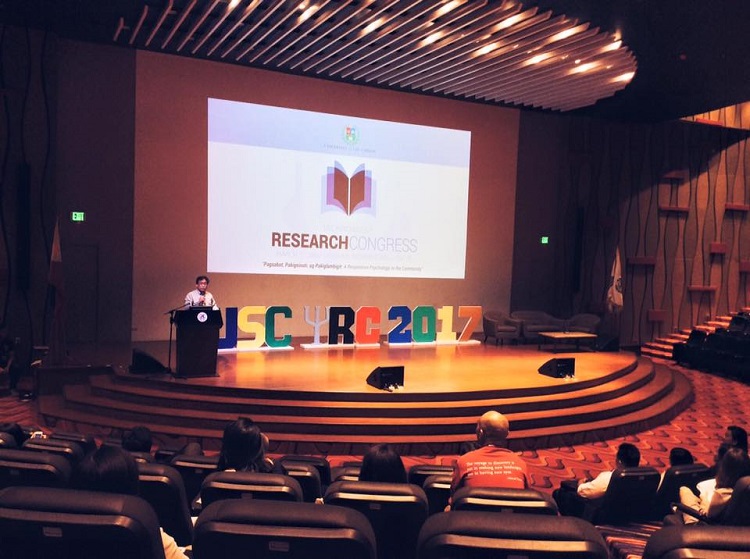
PSYCH RESEARCH. The University of San Carlos Psychology Research Congress was held at the USC – Talamban Campus in Cebu City on March 27. Supplied photo.
By Jason Manaois
Two research papers from Xavier Ateneo’s Psychology Department have been presented at the “USC Psychology Research Congress” at the University of San Carlos – Talamban Campus in Cebu City on March 27.
The findings of the research titled “Moving forward: Resiliency of parents of children with special needs” by XU’s Frances Klite Awatin, Marjorie Lagliva, Ralph Lauren Nobleza, Lumen Cristi Ramos, and Dana Althea Salvacion was shared during the oral paper presentation. The said research was completed through the grant given by the Kinaadman University Research Office under the Kinaadman Support for Student Research undergraduate level.
Another paper from Xavier was accepted for poster presentation, “In the long run: A case study on the experiences, quality of marriage, and well-being of Talaandig child spouses” by Marie Loraine Bacungan, Rio Rosal Baliling, Peter Chrysologu Dagok, Diovince Paulo Kinaging, and Glydelle Mae Peduche.
Bearing the theme “Pagsabot, Pakigsinati, ug Pakiglambigit: A Responsive Psychology to the Community,” congress coordinator James Batara said that research outputs were clear reflections of our deep concern with the communities in need.
The USC-organized congress was participated by faculty and students from XU, Ateneo de Davao University, Cebu Doctors’ University, University of the Philippines, Southwestern University - PHINMA, and the University of the Visayas.
“Research is the life blood of science. It is the based upon which scientific knowledge rests on the shoulders of psychology researchers,” said USC Psych Dept chairman Dr Glenn Glarino. “The reason why we gather in this forum is not just to showcase research skills but importantly to help ascertain the future of research in psychology.”∎
* * * * *
ABSTRACTS OF XU RESEARCHES AT THE 2017 USC PSYCHOLOGY RESEARCH CONGRESS
Moving forward: Resiliency of parents of children with special needs
This study is an Interpretative Phenomenological Analysis of the process of resilience of three (3) pairs of parents of children diagnosed with Autism Spectrum Disorder. The results were obtained through their experiences, definition of resilience, and process of resiliency. The results of the study showed the participants’ own definition of resilience which is composed of intrinsic and extrinsic factors that contributed to their resilient formation. Intrinsic factors include intangible motivations that helped them become resilient which include parent’s perseverance in facing problems, faith, and self-esteem. On the other hand, extrinsic factors are the external driving force that helped the parents which includes the relationship between the parents and the child, relationship of the parents, and relationship of the parents towards family and others. Moreover, different process of resilience on each pair of parents having a child with special needs was extracted from the parents’ experiences. The processes was then merged and synthesized which include (1) awareness of the child’s condition, (2) negative feelings, (3) start of resilience formation, (4) transformation of parenting and (5) transcendence. Implications on future researchers as well as recommendations to the community, school, and government were also discussed.
In the long run: A case study on the experiences, quality of marriage, and well-being of Talaandig child spouses
The case of early marriage is still a tradition up to now on which it is based from our ancestors. It still exists to ensure the preservation of culture and some indigenous tribes practice it to increase their population. With this, the researchers gathered 10 participants who were married below 18 years old and were also married for about eight years and above. In accordance to the research ethics, the researchers obtained the authorization and approval from the National Commission on Indigenous Peoples (NCIP) to conduct a research about the Talaandig couples. Through thematic analysis, the researchers generated seven major themes.
The first variable which is life experiences has three themes namely: decision to marry, dynamics with the spouse and parents’ role. Quality of marriage has four themes namely: sacredness of marriage, contentment and coping, simple living and constant communication. Lastly, well-being has two themes namely: maturity and feeling loved. The researchers found out that the current system of buya or arranged marriage is rarely being followed by the present Talaandig couples, but some cultural practices of their tribe were still significant to them at present. They still give high respect to their elders especially to the sanctity of marriage.
Download the 2017 USC Psychology Research Congress Book of Abstracts here.